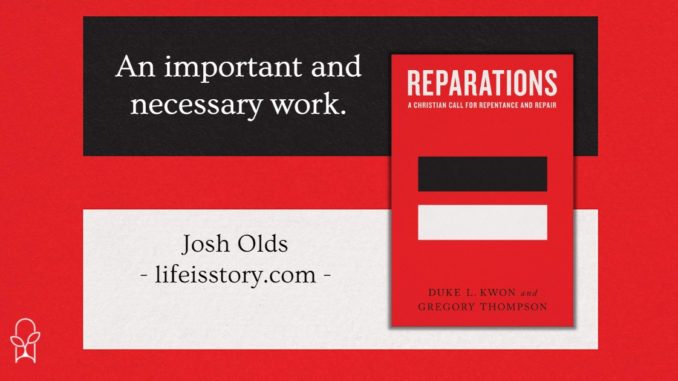
Published by Brazos Press on April 6, 2021
Genres: Non-Fiction, Racial Reconciliation
Buy on Amazon
Goodreads

Christians are awakening to the legacy of racism in America like never before. While public conversations regarding the realities of racial division and inequalities have surged in recent years, so has the public outcry to work toward the long-awaited healing of these wounds. But American Christianity, with its tendency to view the ministry of reconciliation as its sole response to racial injustice, and its isolation from those who labor most diligently to address these things, is under-equipped to offer solutions. Because of this, the church needs a new perspective on its responsibility for the deep racial brokenness at the heart of American culture and on what it can do to repair that brokenness.
This book makes a compelling historical and theological case for the church's obligation to provide reparations for the oppression of African Americans. Duke Kwon and Gregory Thompson articulate the church's responsibility for its promotion and preservation of white supremacy throughout history, investigate the Bible's call to repair our racial brokenness, and offer a vision for the work of reparation at the local level. They lead readers toward a moral imagination that views reparations as a long-overdue and necessary step in our collective journey toward healing and wholeness.
Despite four hundred years of slavery, America as a system—and America as white Christian culture—have never really seriously considered reparations for the enslavement of our Black brothers and sisters. It’s been considered too late (after all, slavery was a long time ago), unfair (I was poor growing up and I made it), and just another government handout (don’t they already get enough welfare?). Whether based on economic policy, ignorance, or straight-up racism, most attempts to start a discussion about reparations have fallen flat.
Reparations: A Christian Call for Repentance and Repair is an attempt to revive the conversation. I think it’s important to note that neither author is Black and do not claim to speak on behalf of the descendants of enslaved people. Instead, they speak as Christians who see reparations as morally and biblically the proper Christian response to generations of systemic injustice. Their goal is not to silence Black voices, but to speak out as people who have benefitted from white supremacy and see the need to make restitution and create justice.
The book is less about the mechanics of reparation and what that would look like and more about drafting an argument for the legitimacy of reparations. The foundational chapters provide a working definition of systemic racism and proceeds to unveil the reality of white supremacy and how, even post-slavery, the economic system was construed to prevent Black people from escaping poverty.
The middle part of the book is the most powerful, as Kwon and Thompson make the case for the church’s complicity in white supremacy and economic injustice. They then call the church to repent and seek to right the wrongs of the past. Whether or not we are personally to blame, we are personally responsible to create justice.
The book ends with chapters on restitution, restoration, and repair. Utilizing texts from the Old and New Testaments and from church tradition, Reparations makes it crystal clear that these concepts are entirely within the ethic of the Kingdom of God and are indeed a moral imperative for Kingdom-followers.
One thing that I wish Kwon and Gregory had done was imagine different ways in which individuals, churches, and governments could practically enact reparation. While systemic injustices require systemic changes, what can individuals do to make reparations personally while advocating for systemic change? How can churches engage in the work of economic justice and reparation? What is the best way to advocate for systemic change? Reparations makes the case for reparations as a moral imperative and paints in broad strokes what areas of our cultural life must change, but knowing that and knowing how are very different things and I wish that more had been done to help readers connect the need to their own individual ability.
That criticism, though, is more based on the book’s conclusions. Okay, you’ve gotten me to this point, but now where do we go? Reparations offers a lot of starting lines, but actually running the race is much different. I’d love to see a follow-up volume with more practical ideas and examples of churches and individuals living out this ethic.
This is such a needed book. Like the authors note in the beginning, they aren’t sure what will come of it. Now, almost a year after the book’s release, I have that same question. It doesn’t matter how good your argument is if the people who need to hear it refuse to listen. Reparations shows that the academic excuses for not considering reparation are just that—excuses. It unveils the hypocrisy of those who continue to benefit from white supremacy. It moves the argument from the head to the heart, showing that it doesn’t matter how great of an argument you have if those in power refuse to listen. Kwon and Gregory have written an important book, a necessary book, and only time will tell its influence on the system.
